The best hunting grounds on the planet are also, not coincidentally, the most difficult to access, the most desolate, and the most inhospitable.
The Yukon checks each box.
Teeming with wild game, the Yukon is as primordial and undisturbed a wilderness as still exists. To the right of Alaska and above British Columbia, it’s the size of Spain with the population of Alexandria, Louisiana.
It’s got twice as many moose as people. Its Rocky Mountains are the highest in Canada. Raging rivers and mountain lakes abound. The weather is unpredictable and extreme.
The Yukon boasts the record low temperature in North America, -83 degrees F. Whatever your level of skepticism about Sasquatch, you’d probably agree that if they do exist, they surely live here.
I’m accompanied by my frequent hunting companion Norman “Beaver” Thigpen and his son Mason, an ultramarathoner, extreme sport enthusiast, and hard-core hunter.
We’re mainly hunting moose, but our potential bonus quarry includes grizzly bear, black bear, timber wolf, mountain caribou, Dall sheep, and wolverine (none of which we’d take, but the variety
underscores the wildness of the place).
We abandon civilization on departure from Whitehorse. On the banks of the Yukon River, Whitehorse was the gateway to the Great Klondike gold rush of the 1890’s.
The aboriginal First Nations People named the city for rapids resembling the mane of a white horse. It’s the capital city and has half the territory’s population.
The Guinness Book of World records lists it as the city with the cleanest air on earth.
We left by float plane as no roads exist where we’re going. For 2 hours we passed over rugged
mountains blanketed in boreal forest. The two-hour flight revealed the majesty and vastness of the
Canadian Rockies, devoid of human presence.
We switched to a smaller float plane for a river landing at base camp. The accommodations were barebones, but the view from atop the river bluff was magnificent, especially when illuminated by the Northern Lights. The head guide was always the last one in the tent at night.
He would zip the tent flaps closed then load his rifle, lay it beside his sleeping bag pointed towards the tent opening. I knew we weren’t in Kansas anymore.
As we dozed off to the primal howling of nearby wolves the first night at camp, we dreamt of giant moose.
On day one, Beaver and Mason remained at basecamp, while my guide Dennis and I relocated to a spike camp 50 miles upriver.
The boat ride took four hours. Within the first few miles of base camp, we spotted several moose on the riverbank, and the sandy beaches were covered in spoor. Clearly, the moose were plentiful. We also saw a grizzly bear run across the river in front of us. Seemingly, our hunt would be easy.
The giant Yukon bull moose stands seven feet tall and weighs 1,800 pounds. It has the largest antlers of any animal on the planet. Although the first few moose we saw were young, I was astonished by their massiveness. They’re like a Clydesdale mixed with a thoroughbred racehorse, with a tree of antlers growing out the top of its head. Even though these animals have rarely if ever encountered humans, most seem a little skittish. They’re equipped with extraordinary hearing and sense of smell. They run fast and conceal themselves in thick forest quickly. They’re also the most powerful and ferocious animal around. Even the grizzly bears fear the mature bulls.
Fortunately, the rut begins the first week of September and runs through the first week of October, putting our hunt during the peak of the rut. The rut makes some bulls aggressive, much less wary, and responsive to calling. For thousands of years, they’ve dominated all other animals. Curiously, they’re sometimes not even afraid of humans.
The boat ride was cold and rainy. The moose we spotted were feeding on chest-high poplars and willows bordering gently sloping beaches. The short trees transitioned into thick spruce forests. As we ascended the river, the river narrowed and was full of rapids. The gentle beaches gave way to steeper rocky banks and the beaches became less abundant and smaller. The depth of the river was skinny. Our ride was rough with submerged boulders, sandbars, and spruce logs lurking below the surface.
Our moose sightings dwindled as we traveled farther upstream. We were strictly prohibited from hunting one side of the river in my area as it’s on the property of First Nations of Na-Cho Nyäk Dun.
A lone grey wolf stared at us from the bank, seemingly guarding the land.
Our spike tent was crude, and our provisions were meager for 8 days in the wilderness. Mason later confessed that he and Beaver enjoyed half my camp’s provisions which we inadvertently left at base camp. A sawed-off shotgun literally loaded for bears was strongly recommended for a nighttime visit to the outhouse. A pine marten ransacked our tent and stole our last snacks, two packs of Twizzlers. His muddy footprints suggested he may have also drank from my coffee cup. He reappeared an hour later running around the tent like he’d smoked crack cocaine.
As the marten ran below my guide’s cot, he screamed like a little girl.
My guide, Dennis, is pleasant, friendly, and works hard. He’s an expert camper. His main job is security at an LNG plant in British Columbia. He’s missing his 30th wedding anniversary for this hunt.
Dedication, or a lack thereof? His attitude is superb, and he hunts hard! His hearing is exceptional. I nicknamed him Radar O’Reilly.
We hunted at least 12 hours a day for the next few days and didn’t see many bulls. In fact, we saw hardly any. Hoping to lure in rutting bulls, Dennis called frequently, but with few responses.
Within days, our prospects for success seemed dubious.
After covering over 200 miles of river in the first 4 days and employing every hunting tactic imaginable, my doubts turned into frustration, tedium, and disappointment. The freezing rain was incessant.
Like an ice bath 5 times daily, the weather tested my resolve. We sped up and down the river, drifted quietly for hours, still-hunted for countless hours, and walked and called; all to no avail. We saw very few animals, and none which nearly met the criteria for harvest. We listened intently to crickets.
A hunter’s mood, enthusiasm and attitude typically wax and wanes over the course of a long hunt. Moose hunting in these conditions challenges one’s spirit like no hunting I’ve ever experienced. In the face of harsh conditions, I was struggling to stay positive.
Fortunately, we heard by satellite phone that Beaver and Mason were experiencing much better hunting at the honey hole downriver. Their guide reported they were seeing big moose.
Beaver and Mason later recounted the highlight of their hunt in vivid detail. Drifting along the river they heard two mad bulls on opposite sides of the river grunting loudly at each other as a battle challenge. They stealthily concealed themselves between the bulls on a river bluff. The wind picked up, and the bulls went silent for 2 hours. The hunters waited patiently.
Mason spotted a grizzly bear that had crept along the beach 40 feet below them. As Beaver quickly repositioned for a shot at the bear, one of the bull moose suddenly revealed himself 330 yards away on the opposite bank, presenting Beaver with a dilemma. Obsessed with the prospect of a bull moose for the last 20 years, Beaver opted to take the moose.
It’s a giant! They celebrated by drinking our entire supply of liquor that night by the fire, bewildered and entertained by a brilliant display of the Northern Lights (in our defense we did not
have proof of life from Mike in over two days). Beaver and Mason hunted the moose gut pile for two days in an attempt to harvest either a grizzle or a wolf, but none appeared.
By day 7, I’d have been equally surprised to see a trophy moose as a Sasquatch doing push-ups
on the beach. In fact, as we drifted downriver the complete silence for spans of over 20 minutes was eerie, interrupted periodically by beavers slapping their tails loudly on the water as an alarm to all wildlife of the presence of intruders. It seemed peaceful, but lonely. I was dejected and exhausted. Dennis seemed undeterred. He lifted my spirits.
By day 7, my reserve of optimism was nearly depleted. Resigned to the high probability of eating my moose tag, I tried to adopt a more positive attitude, anxiously anticipating my return home.
We derive value in life from all experiences; pleasant and unpleasant, successes and failures. I was stoked for Beaver and Mason when I heard about their epic hunt but searched for meaning from my seemingly imminent misfortune.
I refocused on my blessings, like my exquisite wife and my joyful family, the comfort of our lifestyle, and our good health. Maybe that’s the lesson after all?
On day 8, the final day of the hunt, we headed down river toward base camp to pack for the next day’s bush plane to civilization. We hunted along the way, eyes scouring a beach where we’d seen a grizzly 6 days earlier. Suddenly and unexpectedly, as if conjured by my vivid dreams, Bullwinkle arose from a nap on a broad beach ahead. Eureka!
The monster bull was dumb with territorial rage. As elusive as these ghosts had been, this old warrior, face scarred deeply by a lifetime of violent battles, seemed to offer his spirit freely. When he saw us, he didn’t run. He swaggered toward us for a fight. As sometimes happens on a tough hunt, the unlikely magically becomes so simple. Persistence was, as it often is, rewarded handsomely. Dining on delicious moose steaks around the campfire, we regaled each other with exciting stories of the hunt, and the travails along the way. The Yukon is the wildest place we’ve ever experienced. As we zip our sleeping bags for the night, I dream of home, of my first bath in a week, of a return someday to this harsh paradise, to the call of the wild.



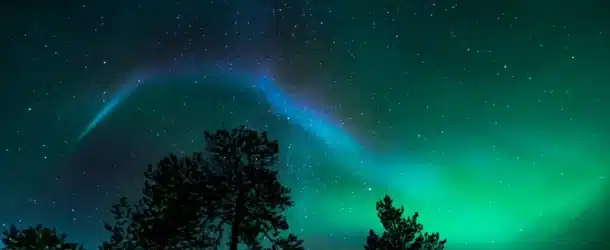
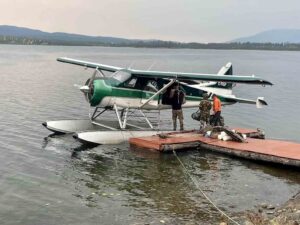
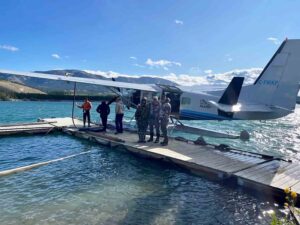
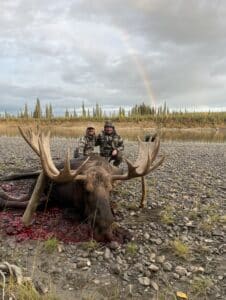
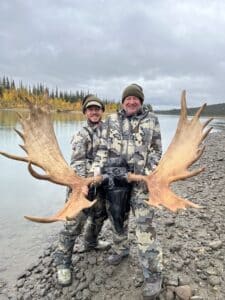
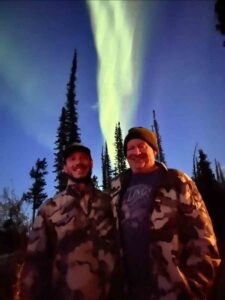
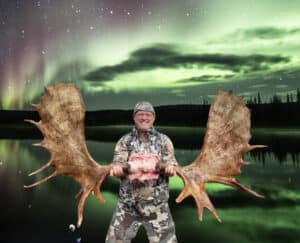











Comments are closed.